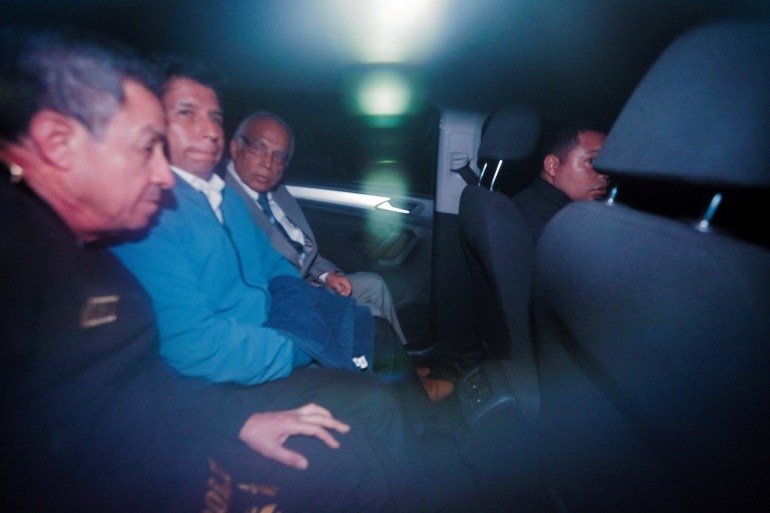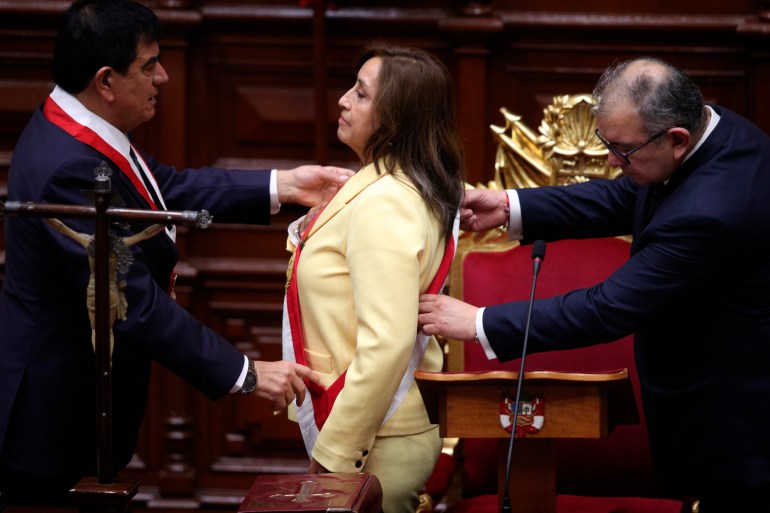Peru ex-President Castillo detained as ‘rebellion’ probe proceeds
A judge in Peru has ordered Pedro Castillo to be detained for seven days as authorities investigate charges of “rebellion and conspiracy” against the former president, who was removed from office and arrested this week.
Castillo made his initial court appearance via videoconference on Thursday, a day after Congress overwhelmingly voted to remove him in the third impeachment attempt of his embattled and short-lived presidency.
Thursday’s preliminary court hearing sought to evaluate the legality of Castillo’s arrest, as well as touch on an inquiry by the attorney general’s office into charges he orchestrated an alleged rebellion.
Looking downcast and nervous, the former teacher’s union leader gave simple yes or no answers and declined when asked if he wanted to address the court. A few hours after the hearing ended, Castillo was ordered to a seven-day preliminary jail sentence as the investigation proceeds.
Peru’s opposition-held legislature voted to remove Castillo from office on Wednesday afternoon, just hours after the left-wing leader had signalled plans to “temporarily” dismiss Congress and rule by decree.
Castillo had said the measures aimed to “reestablish the rule of law and democracy” in the South American nation but his announcement sparked widespread condemnation from observers who accused the president of carrying out a “coup”.
After Congress successfully passed the impeachment vote, Castillo was taken into police custody in the capital, Lima. He is being held in a police prison where former President Alberto Fujimori, convicted of rights abuses, is also detained.
The Peruvian prosecutor’s office said it carried out a dawn raid on the presidency and some ministerial offices in Lima in search of evidence against Castillo.
Castillo’s defence team has argued he was arbitrarily removed from Peru’s presidency on trumped-up charges of rebellion. “It is clear that the crime of rebellion was not committed” because it did not materialise, argued one of his lawyers, Victor Perez.
Mexican President Andres Manuel Lopez Obrador revealed on Thursday that Castillo had called his office to request asylum in his country’s embassy, which he planned to grant, but the Peruvian leader was arrested before he could arrive.
Mexico’s ambassador to Peru was able to meet with Castillo where he is being detained, Mexico’s Secretary of Foreign Affairs Marcelo Ebrard also said.

Al Jazeera’s Mariana Sanchez, reporting from outside the Lima prison where Castillo is being held, said a small group of his supporters had rallied outside the facility on Thursday. “[They] are very concerned about the wellbeing of Castillo,” Sanchez said.
“Prosecutors have asked [for] a preliminary detention. Castillo will stay here [in prison] because there is a danger, according to prosecutors, that he could escape,” she added.
Meanwhile, Dina Boluarte, who was sworn in on Wednesday afternoon as Peru’s first female president after the impeachment vote, has pleaded for a “truce” to unite a nation marked by years of political instability and divisions.
Boluarte, who formerly served as Castillo’s vice president, also suggested she would consider holding early elections – something that requires approval of a hard-to-muster constitutional amendment. “I know there are voices indicating early elections and this is democratically respectable,” Boluarte said on Thursday.
Castillo’s stunning fall came after he narrowly edged out his right-wing rival, Keiko Fujimori, in divisive 2021 elections.
But his presidency was marred by allegations of corruption almost from the start. The political novice also was accused of incompetency after he appointed five cabinets and an estimated 80 ministers in just over a year and a half in power.
His latest legal battle began in October when the prosecutor’s office filed a constitutional complaint against Castillo for allegedly leading “a criminal organisation” to profit from state contracts and for obstructing investigations.

Congress summoned him last week to respond to accusations of “moral incapacity” to govern. Castillo had called the allegations “slander” by groups seeking “to take advantage and seize the power that the people took from them at the polls”.
On Thursday, Colombia’s left-wing President Gustavo Petro said Castillo had committed “political suicide” by weaponising a seldom-used clause of the constitution to combat his adversaries in Congress, who he said never allowed Castillo to govern.
“Anti-democracy can’t be fought with more anti-democracy,” said Petro, echoing similar comments by Brazil’s incoming President Luiz Inacio Lula da Silva.
Petro also called on the Inter-American Commission on Human Rights to intervene, saying Castillo could not get a fair trial in Peru.




